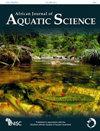南非最大泛滥平原内水生生态系统的水和沉积物质量评估
IF 1
4区 环境科学与生态学
Q3 MARINE & FRESHWATER BIOLOGY
引用次数: 1
摘要
Ndumo禁猎区(NGR)是一个拉姆萨尔遗址,位于夸祖鲁-纳塔尔北部南非最大的泛滥平原(Phongolo河泛滥平原),拥有重要的水生生态系统:Usuthu河和Phongolo河流及其相关的泛滥平原湖泊。虽然Phongolo河受到管制,但Usuthu河不受管制,影响拉姆萨尔系统下游环境质量的人为活动较少。本研究评估了NGR中泛滥平原系统的环境质量。在不同的水文时期(流量),对河流和相关洪泛平原湖泊的水和沉积物进行了采样和分析。利用多元统计技术,对生态系统的离子组成以及水和沉积物质量指数进行了评估。关键发现表明了空间和流量相关的差异,这突出了上游集水区和河流对各自泛滥平原湖泊的人为影响。环境质量(水和沉积物)可分为“良好”和主要未受影响。值得注意的是,河水的离子组成表明了不受管制的乌苏图河的重要性,以及它对NGR内水生生态系统及其持续功能的贡献。质量指数进一步表明,金属目前不会对这些系统构成任何生态风险。本文章由计算机程序翻译,如有差异,请以英文原文为准。
An assessment of water and sediment quality of aquatic ecosystems within South Africa’s largest floodplain
Ndumo Game Reserve (NGR), a Ramsar site, situated in South Africa’s largest floodplain (Phongolo River floodplain) in northern KwaZulu-Natal, with important aquatic ecosystems: the Usuthu and Phongolo rivers and their associated floodplain lakes. While the Phongolo River is regulated, the Usuthu River is unregulated and subjected to fewer anthropogenic activities that influence the downstream environmental quality of this Ramsar system. The present study evaluates the environmental quality of floodplain systems in the NGR. Water and sediment were sampled and analysed from both rivers and associated floodplain lakes during different hydrological periods (flow). Using multivariate statistical techniques, ionic compositions, as well as water and sediment quality indices of the ecosystems were evaluated. Key findings suggest spatial and flow-related differences, which highlight the human-driven impacts from the upper catchments and the rivers influence on their respective floodplain lakes. The environmental quality (water and sediments) could be classified as ‘good’ and predominantly unimpacted. Notably, ionic composition of river water showed the importance of the unregulated Usuthu River and its contribution to aquatic ecosystems within the NGR and their continued functioning. The quality indices further indicated that metals do not currently pose any ecological risks to these systems.
求助全文
通过发布文献求助,成功后即可免费获取论文全文。
去求助
来源期刊

African Journal of Aquatic Science
MARINE & FRESHWATER BIOLOGY-
CiteScore
3.90
自引率
7.10%
发文量
31
审稿时长
>12 weeks
期刊介绍:
The African Journal of Aquatic Science is an international journal devoted to the study of the aquatic sciences, covering all African inland and estuarine waters. The Journal publishes peer-reviewed original scientific papers and short articles in all the aquatic science fields including limnology, hydrobiology, ecology, conservation, biomonitoring, management, water quality, ecotoxicology, biological interactions, physical properties and human impacts on African aquatic systems.
 求助内容:
求助内容: 应助结果提醒方式:
应助结果提醒方式:


